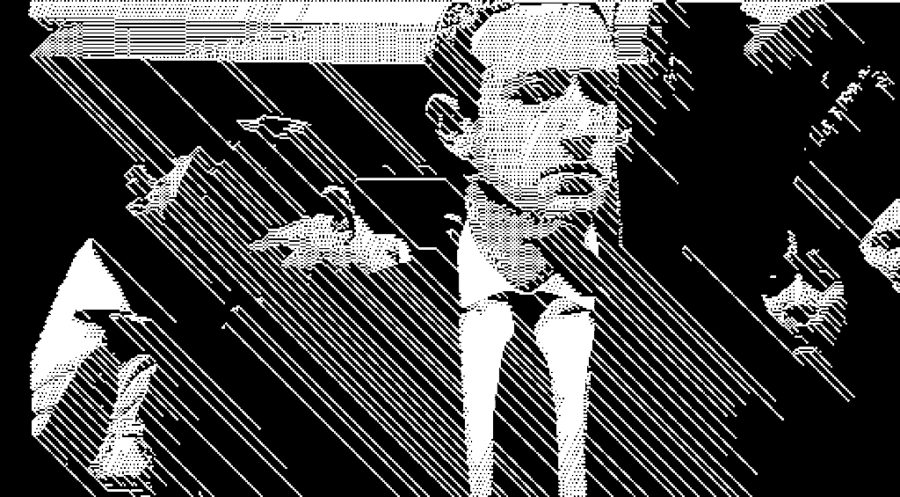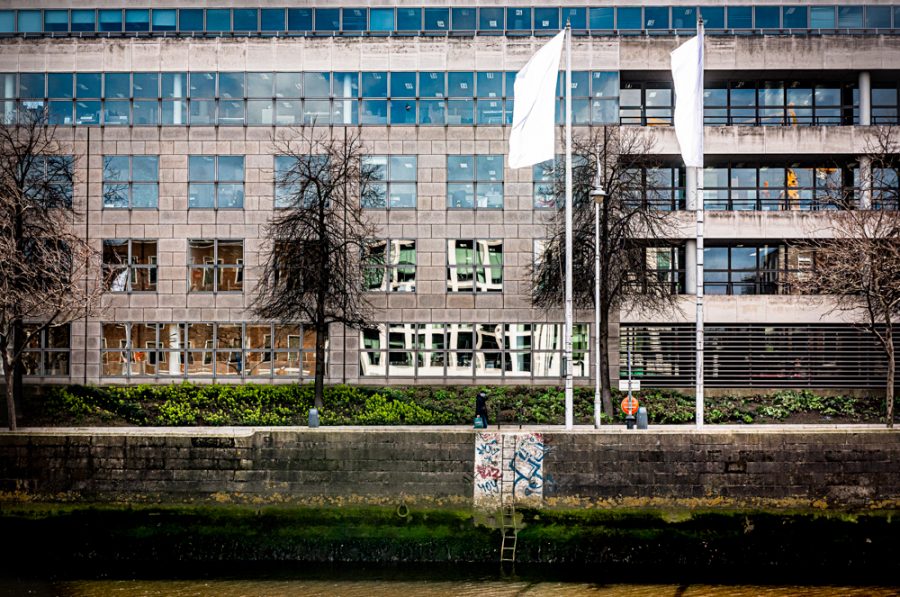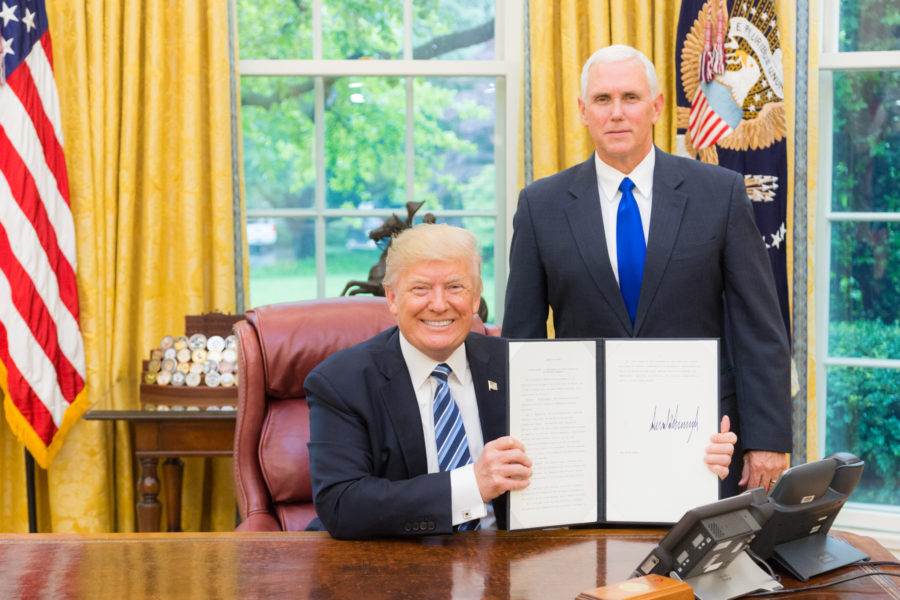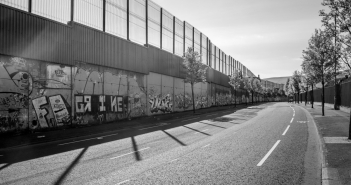In the blink of an eye everything can change in the way we live our lives. How do we manage to live, socialise and maintain public health?
A recent article by Jennifer O’Connell ‘We are world experts at anomalies and blind eyes’ led me to recall how turning a blind eye brought incarceration of pregnant women in laundries and to others living out their lives in psychiatric institutions. But also, that the default creative solution taken by those who do not have the luxury of access, or the means, to survive and thrive within rules laid down by those who do, is to selectively blinker themselves to such rules. And how turning a blind eye to such anomalies is a usually unacknowledged aspect of the way a tate functions.
A Belgian psychiatrist, speaking from the floor at one of the meetings called to form the European Association for Psychotherapy, proposed ‘an ability to deal with ambiguity’ as a definition for mental health.
Jagged Lines
In a time of extreme change, such as that witnessed during the pandemic, and which climate change may well produce, we may have to live with increasing contradictions.
I remember attending a talk given by the late Virginia Satir in Dundrum in Dublin. Satir was one of the earliest family therapists in the United States, focussed on bringing about system change through communication.
She drew a jagged trajectory from one straight line to another. The jagged part indicated the chaos experienced as a system, or family, moves from stasis through change.
As I was pregnant with my first child at the time, it was helpful to recall the jagged line as I struggled to change nappies, deal with nappy rash after soaking the cloth ones in buckets and washing them (we aspired to mind the planet in the 1980s too), before surrendering to the absorbent benefits of paper while, getting by on less sleep than I’d ever managed.
“The first weeks of parenthood are chaotic,” a thoughtful friend rang me to say. ”It will be a lot better in six weeks’ time.”
The jagged line has been a handy reminder in later periods of change and adjustment too, not least during lockdowns and when getting used to wearing a mask.
Catch 22
Pain-inducing contradictions can arise. This may lead either to a psychological pathology or, by way of rising above it, creative solutions.
A subject explored in essays by Gregory Bateson in Steps to an Ecology of Mind (Paladin, 1973) in which he critiques previous work from his Palo Alto team proposing the Double Bind theory.
The double bind is a situation requiring the subject – in a relationship which cannot be escaped from – to choose between alternatives in which they will be wrong-footed either way. In other words, they experience themselves living in a continuing Catch 22.

Mount Fuji
‘Benefits of Inconvenience’
A recent interview on the Design Talks Plus programme from NNK Japan television offers encouragement. In what may be a turning from the belief that technical progress is always to our advantage, Professor Kawakami Hiroshi of Kyoto University of Advanced Science has spent a decade researching what he calls ‘the benefits of inconvenience’. He argues for less convenience and that the effort required to make sense of the world, while facing challenges, may contribute to a better sense of meaningfulness and wellbeing.
Hiroshi cites a return to the use of rough earth in children’s playgrounds (balance challenging) and finding the way on foot around a city without satnav – ensuring the need to pay attention to surroundings – as examples. To emphasise his point he began by asking: ‘If you were climbing Mt. Fuji would you want an escalator’?
The inconvenience in rising to the challenge of struggling with contradictions in rules for living with Covid 19 (and our recent further re-opening of opportunities to socialise) could be seen as an opportunity.
Maybe the rewards will offset the difficulties. Providing, that is, those struggling are not punished for choices that, either way, will put them in the wrong.
If restrictions spawn imaginative solutions, in line with the spirit of preventing the spread of variants of Covid-19, crucially, formulated in ways appropriate to particular local situations, then the sense of satisfaction might end up enhancing a sense of well-being
Unlikely? Maybe. But maybe not. These regularly madden me but, and as Jennifer O’Connell indicated in her article, they are the kind of ‘Irish solutions’ we might be said to excel at.

Mark Zuckerberg at the Congressional Hearing
Where to Look
I was relieved – hope restored – hearing Roger McNamee, one of Mark Zuckerberg’s early mentors and author of Zucked (UK Harper Collins,2019), on the RTE radio morning news bulletin on October 29th 2021 saying that the Facebooker owner’s launch of Meta, his new holding company, is his way of distracting the world from Frances Haugen’s account. The Facebook whistleblower revealed to the U.S. Congress and a UK Select Committee in the last couple of weeks the ways Zuckerman prioritizes profits over safety. McNamee thought it was also aimed at saving Zuckerman from being held to account.
What’s hopeful about that? Only that Roger McNamee spoke out and RTE radio reported what he had to say. In the same week I was fuming about an article in the Business Post (Oct, 24th) by Dan O’Brien ‘Covid 19 has brought out the inner catastrophist in our national psyche’.
I forced myself to complete it several days after I had put it to one side. I wanted to be able to respond to it, but also to offer him at least the courtesy of considering what he had to say, especially given he has had to listen to that he clearly has found difficult in the national conversation.
I had no argument with the generally accepted facts outlined. However, his omission of the crucial fact that the Irish health system has been more inclined towards collapse than the other European countries he mentions bothered me. That, alongside his use of adjectives, indicated a bias I saw as otherwise unacknowledged. Although mention of his Brazilian wife did offer clues.

Photo by Daniele Idini.
Catastrophising
What most annoyed me was that Dan O’Brien wrote of Irish ‘catastrophising’ conversations. Longer lockdowns here contrasted with the reactions of Italy or Brazil. His hypothesis is that this might be due to their twentieth century experiences of living with war.
How ought we best manage the fears evoked by a threat? Our bodies are wired for fight or flight. The extreme version of flight is denial, ignoring of facts that we cannot face.
It can allow us to hide from reality or feel unrealistically invincible in our fighting. Maybe that’s what is needed in wars. In contradiction to O’Brien’s argument, the truth generally is that the more traumatised we are the more likely we may be to use these defences.
Of course, we need psychological defences that enable us continue to cope during difficult times. Talking about our difficulties and continuing to take the difficult decisions, to find the least bad solutions that we can manage to act on, is usually considered the healthiest way of managing.
We need to put on blinkers at times and to remain focused on the direction required. But blinding ourselves entirely to the traffic – the many difficulties and demands of the times we live in – can only lead to more of the same.
In Addition
We are drawn to solutions that best serve our own interests. Financial Times journalist, Tim Harmon’s book How to Make the World Add Up (2021) reveals research showing that we are more likely to make decisions based on the attitudes of the groups with which we identify than with scientifically proven facts, and that this has also been shown to be true of scientists themselves.
We want to remain part of our group or tribe. This is research worth taking into account with regard to vaccine take up and hesitancy. Maybe it is important to acknowledge that Dan O’Brien is interested in economics and business and that my background, which also began with a social science perspective, has been a thirty-year career in psychotherapy before I turned to writing. We may have different loyalties affecting our perspectives.
A quick re-read of what Tim Harford had to say about our use of statistics led me to his first rule for evaluating their use: ‘What are you feeling?’
He goes on to suggest that looking at how those feelings might be influencing your use of figures can be the best way to ensure accuracy, and the avoidance of spreading ‘false news’.
I asked myself about the anger fuelling the fingers on my keyboard. I realised it was driven by fear. My own catastrophising of how O’Brien’s article might undermine the national effort. My fear that Covid numbers are rising. I don’t want another lockdown.
However accurate or questionable O’Brien’s hypothesis, he has given me a timely reminder about rushing to the page. Writing can be a way of working things out. Emotion may fuel effort, but it had better be interrogated to discover what it is really saying if the greater truth is to be served.
The need to keep financially afloat and the need to save as many lives as possible can be at odds, nor are they unrelated. Funds are necessary.
Basic services, food and shelter are as essential and contribute as much to public health as other considerations, and have to be paid for. The challenge is to engage with, and work to rise above, fear and strive to find the least damaging solutions. We are left to wonder how we decide what is best amidst the confusion during times of change.

Donald Trump and Mike Pence.
Politics of Distraction
What do Trump, Zuckerman and Johnson have in common? They are masters, albeit not alone, in offering distraction, a form of click-bait news that feeds a greed for sensation that briefly satisfy but cannot ultimately sate humanity.
The distraction makes us look away from what is really at hand and makes us focus instead on what we prefer.
‘Get Brexit done’ for Johnson. In Trump’s case, spreading so much false news that there is no longer any focus on the truth, or otherwise, in his own assertions. Listeners are led to believe all news is untrustworthy and that he alone should be listened to and receive votes.
And, then there is the promise of a future, technologically ‘advanced’ virtual world – with new toys – in the case of Mark Zuckerman. This is leads to a temptation to avoid looking too closely at the degree of control he has, and the damage that control has done.
Commentators other than Roger McNamee acknowledge that Zuckerman’s plans for his venture were long in the making, and point to the direction he would like to go in future while trying to re-engage a younger demographic, but the timing of the announcement means that Roges McNamee is making sense.
Eye on the Ball
There will be many anomalies, distractions and frightening challenges to confront as we endeavour to live with the pandemic, while keeping our eyes open to the threat of the Earth becoming uninhabitable, at least for humans.
We’ll need to recall Satir’s jagged line between the two straight ones that each indicated more settled times. Sometimes a withering eye may be needed and sometimes we will need to challenge ourselves to recognise our prejudices and look again, turn ourselves away from simplistic blame and less urgent conflicts, save our energy for the war by being willing to lose relatively insignificant battles.
There will also be occasions when turning a blind eye will be compassionate and politically essential and others again when we just need to manage to turn off the news and blind ourselves to what is going on around us for our own sanity. Hopefully we will also find the fortitude in time to turn again to face what needs to be faced and take the right actions within our ambit of control.
Featured Image: The Blind Leading the Blind by Pieter Bruegel the Elder




